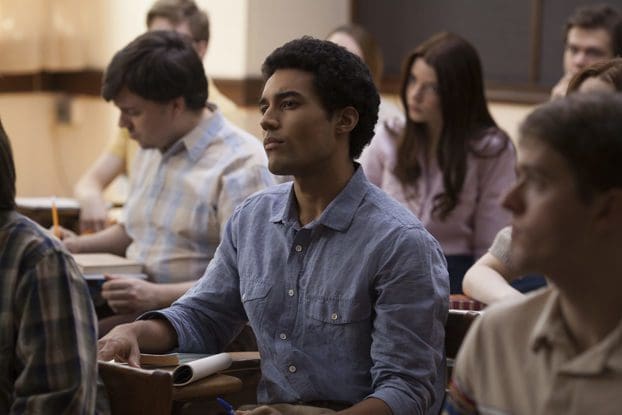Written by Josh Sarnecky

Barry Plot Summary:
When Barack “Barry” Obama (Devon Terrell) arrives in New York City in 1981 to attend Columbia University, he enters a foreign world unable to provide a place for him. Disconnected from his predominately white classmates and the black New Yorkers in his neighborhood, Barry struggles to discover where he belongs, who can understand him, and what kind of man he’ll become.
I find it odd enough when movies are made about someone that is still alive, but I consider it downright bizarre for there to be movies made about a president while he’s still in office. Yet here we are with not one but two films (Barry and Southside with You) that explore the early years of the man that would become the 44th president of the United States. While I haven’t seen and can’t speak for Southside with You, my biggest fear entering my viewing of Barry was that the film would become a shallow propaganda piece that painted an impossibly idolized version of Barack Obama in his 20s. Thankfully, the filmmakers avoided this route and instead opted to create a movie that shows a flawed man with immense potential who has to contend with the biases of others and his own insecurities. I can’t say how accurately the film corresponds to events that actually happened in Obama’s life, but the movie certainly approaches its subject with a sense of realism. Even by the end of the film, Barry does not leave us with a particularly heroic portrait of young Barack; instead, viewers are given a character that is very much human but clearly taking the steps to become the inspiring figure he is today.
In its attempt to show what made 20-year-old Obama tick, Barry places an appropriate focus on race. Though Obama will be remembered as the country’s first black president, this film reminds viewers that Obama is actually the product of a mixed race union and that his racial composition played a major role in his development. Barry (the character) encounters the troubling interplay between race, class, and education throughout the movie and questions how these factors impact his relationships with his classmates, friends, neighbors, girlfriend, parents, and self. The result is a character that often comes off as overly self-involved and cynical, a stark contrast to a presidential candidate that would run on a platform of hope and unity. Yet Barry remains likable even as he pushes his white mother Ann (Ashley Judd) and white girlfriend Charlotte (Anya Taylor-Joy) away because his actions come from a place of frustrated introspection rather than true resentment. Barry truly doesn’t belong in any of the environments he visits, making him sympathetic and somewhat tragic. And while the movie doesn’t resolve Barry’s issues, the film leaves Barry in a vulnerable state where he can start the hard work of coming to terms with his own insecurities. Overall, then, Barry provides both an excellent character study and examination of the impact of race on identity.
Devon Terrell should be given a significant amount of credit for the film’s success. Playing one of the most recognizable men in the world carries some unique challenges, but Terrell manages to capture many of Obama’s mannerisms and deliver a performance that never feels like hollow imitation or parody. He nails the film’s main introspective moments and displays an impressive amount of range and chemistry with the rest of the cast. Speaking of which, Anya Taylor-Joy and Avi Nash (who plays Saleem) may be the movie’s hidden gems, stealing many of the scenes in which they appear. Taylor-Joy is quickly becoming one of Hollywood’s most popular young actresses, starring in The Witch, Morgan, and Split; based off of her commanding presence in Barry, I wouldn’t be surprised if she continues to be someone worth watching for years to come. Nash, meanwhile, has very few credits as of yet, but his turn as the film’s comedic relief proves that he has a ton of potential. I truly am excited to watch what this young cast has to offer in their future projects.
On the other hand, there isn’t much behind the camera that truly stands out about the film. Barry’s soundtrack is rather forgettable, some of the transitions between scenes are underwritten or poorly edited, the plot meanders, and the writers occasionally seem unsure how they want to Barry to feel about politics and the government. Other than the film’s exploration of race and the core trio of Barry, Charlotte, and Saleem, the movie doesn’t contain any distinctive features. Much of this movie’s relevance and strength comes from the fact that its protagonist is a young Obama; had Barry followed a purely fictional character with the same background, the film would lose the majority of its intrigue and be a good but somewhat forgettable affair.
Barry may not be a full biography of the POTUS, but the movie is undoubtedly an engaging look into Obama’s time at Columbia University and how his college experience shaped him into the man he is today. With Obama’s final term about to end, audiences can expect a number of Obama biographies to hit the silver screen in the future. When those films eventually come out, Barry should be remembered not only as one of the first films about our 44th president but also as a solid character study in its own right. And for that, we can all say, “Thanks, Obama.”

